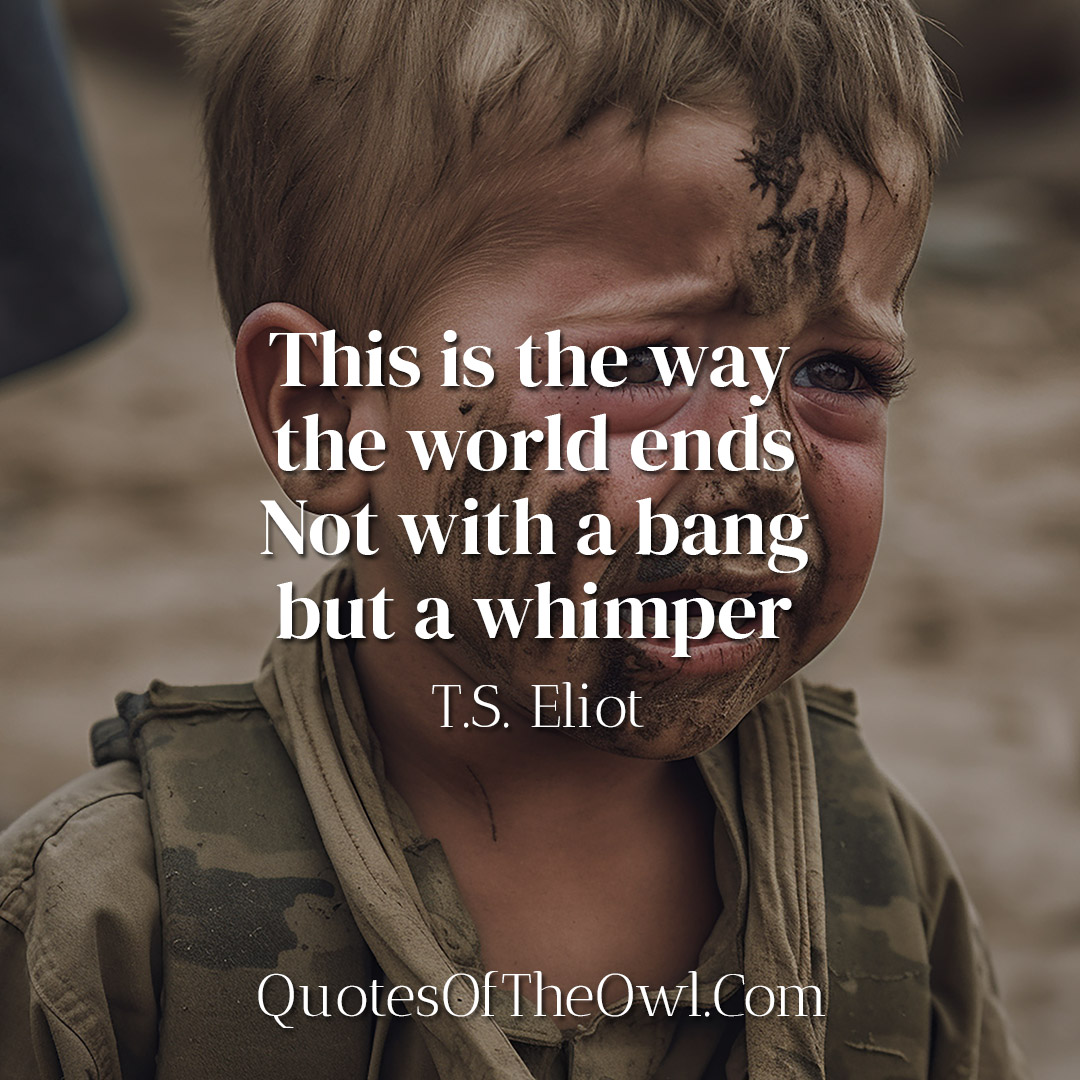What is the meaning behind Eliot’s Quote: “This is the way the world ends, Not with a bang but a whimper”?
Poetry has the power to encapsulate complex and profound ideas in a few carefully crafted lines. In the case of T.S. Eliot, one of the most renowned poets of the 20th century, a particular quote stands out for its enigmatic and thought-provoking nature. “This is the way the world ends, Not with a bang but a whimper.” These words, taken from his famous poem “The Hollow Men,” have sparked curiosity and debate among scholars and readers alike. In this article, we will delve into the meaning behind Eliot’s quote and explore its significance in the context of his works and the modern world.
Understanding the context: The poem and its themes
To fully comprehend the meaning of Eliot’s quote, it is essential to have a grasp of the poem it originates from, “The Hollow Men.” T.S. Eliot, a highly influential poet of the modernist movement, crafted this poem in 1925, reflecting the post-World War I disillusionment that permeated society. It embodies themes of existential despair, religious uncertainty, and the human condition. By examining the poem’s symbols and motifs, we can unlock the deeper meanings behind the quote.
Decoding the quote: “This is the way the world ends, Not with a bang but a whimper.”
Taking the quote at face value, it suggests that the world will not end in a dramatic or cataclysmic event but rather in a quiet, unremarkable manner. This interpretation aligns with the overall tone of “The Hollow Men,” which portrays a world devoid of purpose and passion. However, Eliot’s words go beyond the literal meaning, inviting readers into a realm of symbolism and metaphorical exploration.
Symbolically, the “bang” represents a sudden and explosive end, possibly signifying war, chaos, or a catastrophic event. On the other hand, the “whimper” signifies a gradual decline, a fading away without any lasting impact. It evokes a sense of resignation and insignificance, highlighting the despair and hopelessness that pervades Eliot’s worldview.
Eliot’s philosophy and worldview
To truly grasp the meaning of the quote, it is essential to delve into Eliot’s philosophical and religious beliefs, which greatly influenced his works. As a modernist poet, Eliot grappled with the existential crisis and sought to express the fragmentation and disillusionment of post-war society. His work often reflects a combination of religious and secular perspectives, exploring themes of spiritual emptiness and the loss of traditional values.
Eliot’s quote encapsulates his pessimistic outlook on humanity and the world. By contrasting the “bang” and the “whimper,” he highlights the dichotomy between dramatic, transformative events and the slow decay that often characterizes societal decline. This stark juxtaposition speaks to Eliot’s overarching belief in the insignificance and futility of human existence.
Relevance in today’s world
Though written almost a century ago, Eliot’s quote continues to resonate and hold relevance in today’s world. It serves as a reminder of the fragility of human accomplishments and the potential consequences of societal indifference or complacency. In an era marked by global issues such as climate change, political unrest, and ethical dilemmas, Eliot’s message reminds us of the gravity of our actions and the potential ramifications of our collective choices.
Conclusion
T.S. Eliot’s quote, “This is the way the world ends, Not with a bang but a whimper,” carries profound meaning beyond its simple words. It encapsulates the poet’s philosophy of despair, disillusionment, and the impermanence of human existence. Its enduring relevance reminds us of the importance of introspection and collective action to avoid a whimpering end. Let Eliot’s words serve as a catalyst for reflection and a call to action in shaping a better future.
Embark on a journey of wisdom and introspection – Explore T. S. Eliot Quotes now!
Recommended Book by T.S. Eliot: Old Possum’s Book of Practical Cats

